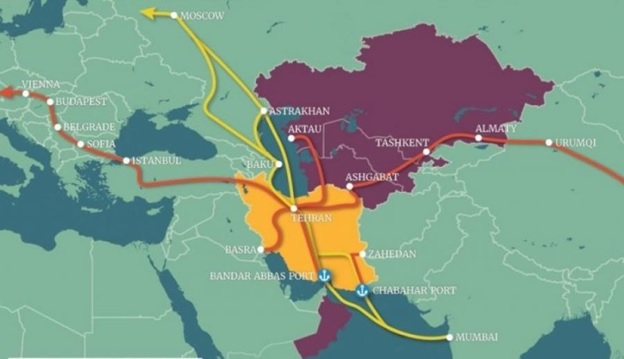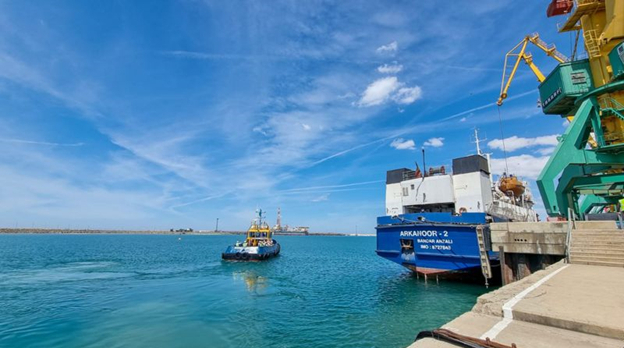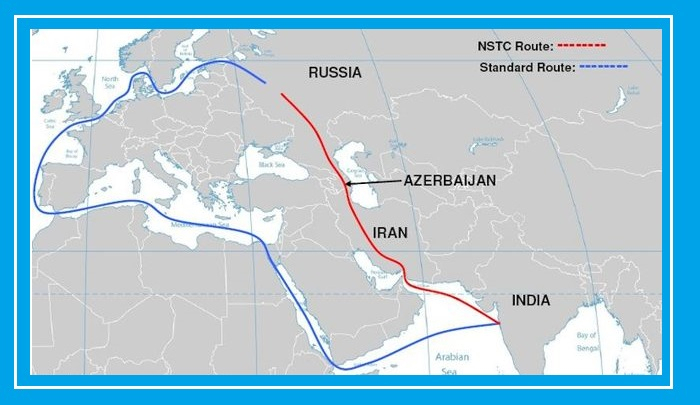‘The North-South corridor is the alternative route for trade among India, Iran, and Russia. They are already doing so, but at the cost of huge logistics expenses, which have turned into a long and expensive process. The full launch of the North-South corridor will enable these countries to benefit more from this process’, said economy expert Khalid Karimli in his interview to Az.Vision.az.
The expert elaborated that Russia and Iran, facing severe sanctions by the West, find it important to have an alternative transport corridor bypassing the risky NATO region. As the freight traffic grows, one corridor alone will not suffice to carry it.
‘The railways in Iran and the CIS differ in width. The lines we have inherited from the Soviet Union are wider, whereas the international standards require a smaller distance between the tracks. This leads to loss of time, burdening the terminals. The corridors without alternatives will, therefore, be heavily congested. The countries are hard at work on various alternative routes of both the Trans-Caspian and the North-South corridors.
All participating countries will benefit from the corridor’s launch. Apart from the West line through Azerbaijan, there is also the East line connecting Iran, India, and Kazakhstan to Russia. Yet another direction is the direct seaway to Russia, via the Bandar Abbas-Anzali-Astrakhan route.’

- What can you say about the potential of the East line? What are the interests of various countries in it?
‘The East segment of the North-South corridor bypasses Azerbaijan. The participating countries are India, Iran, Kazakhstan, and Russia. Kazakhstan naturally has interests. But Kazakhstan, as a member of the Organization of Turkic States, is also a friendly country to Azerbaijan.
The West segment of the North-South Corridor, where Azerbaijan also partakes, is considered the shorter and more convenient route. The parties of the transport corridor are obviously interested in maximum diversification because Russia, Iran and India are countries with serious potential for economic growth.’
- What is the situation in the Trans-Caspian tributary?
‘Azerbaijan pays utmost attention to freight shipping in the Caspian Sea. Investing in the Alat port is a clear illustration. Alat Port is also one of the crucial elements in the East-West corridor. The country is putting in additional work to up transmission capacity from 15 million tons to 25 million. The initially envisaged 15 million tons no longer meet the needs and the capacity must be increased, which also raises the importance of expanding the port to meet the needs.

We are advocates for transforming the Caspian Sea into the sea of trade and peace. Azerbaijan has a sufficient fleet and enough merchant vessels, and we are now allocating special investments in increasing the quantities. The Baku Shipyard operates at full capacity and contributes greatly to Azerbaijan’s commercial fleet. We want Azerbaijan to take part in both the North-South and East-West transport corridors. Our sea routes will obviously participate as a direct element in the East-West corridor. The freight from Iran to Russia through the Trans-Caspian Sea route in the North-South corridor could be transported by Azerbaijani ships.’

- How will we benefit from all this?
‘Azerbaijan will gain both economic activity and boost transit revenues through ensuring that all transport corridors, trade, and cargo flows pass through its territories. This will also allow our entrepreneurs to make more optimal purchases in these cargo flows, cut their costs, increase trade opportunities, and gain more benefits in purchases and sales. The benefits for the economy are not only the promotion of the strategic importance of the country, but also the increase in transit-financial income, boost of economic activity and stimulation of employment. This attributes to both the North-South and the East-West corridor.’
- How important is the Western route of the North-South corridor and for which countries?
‘We are certainly more interested in a more vigorous operation of the India-Bandar Abbas (Iran)-Baku-Russian direction, the Western segment of the North-South corridor. Starting this route will offer many benefits. We are more involved in launching the route through Azerbaijan, as the land connections are already in place. Heavy goods vehicles transport cargo from Bandar Abbas port to Russia through Astara, starting from the East in India. However, utilizing another crucial element of the corridor, the railroad, would also be beneficial.

India, Iran, and Russia’s current trade roads run via a long sea route through the Mediterranean Sea. They have a smaller volume for land transportation. Installing the railway routes proposed within the North-South corridor and operating them at full capacity will be profitable for all transporters and users. The estimations show that it will save a whopping $2,500 per ton of cargo. The travel from point of exit to destination will also be significantly shorter.
The Qazvin-Rasht portion of the Qazvin-Rasht-Astara railways is already operational, and the construction of the Rasht-Astara section is underway. As all the railway lines are completed, the freight flow through Azerbaijan will further boost the transmission capacity of the transport corridor.’
AzVision.az
More about:















































